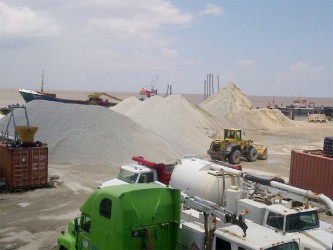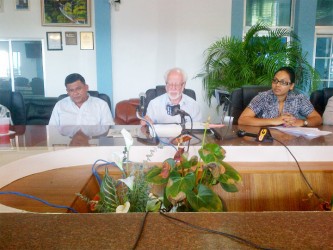President Donald Ramotar has announced intentions to import stone to cover the perceived supply shortage being seen but Managing Director of BK International Brian Tiwari says that the President’s statements are badly informed.
In an article published in the most recent edition of the Sunday Chronicle, the President reportedly stated that “he had recently reviewed the pending and ongoing infrastructural works in the country and realized they were beset by challenges, one of which is the inability of the local quarry

establishments to produce adequate amounts of stone to satisfy current demand.”
Quite the opposite, BK Public Relations Consultant Kit Nascimento said, adding that the company’s supply of stone has, for some time, exceeded local demand.
Even as the company engaged the media yesterday morning, Nascimento said, 10,000 tonnes of stone sat at BK’s Water Street, Kingston location, while another 10,000 tonnes remained at its quarry in Essequibo. He said BK produces approximately 30,000 tonnes of stone daily, which, using its ships, it quickly delivers to contractors in Demerara, Berbice and Essequibo. Further underlining the message the company was trying to communicate to the public yesterday, Director of Material Supplies Gail Tiwari said the company has no outstanding supply contract with any contractor.
This is testament to the fact that there is no shortage, Brian Tiwari said, adding that the perceived shortage was a result of contractors not having sufficient finances to immediately pay for the materials they need.
According to Gail Tiwari, because they are turned away for not being able to provide cash on demand, contractors seem to have concluded that they have not been supplied because there is no supply. This perception may have something to do with the payment system employed by the company. Gail Tiwari said that several years ago contractors were able to receive materials on credit but this has changed.
Over the last two years, she said, contractors have amassed credit accounts with the company to the tune of $50 million; a sum which the company is not willing to go past, especially since collecting these outstanding amounts is proving to be a challenge.
Even the Ministry of Public Works, Brian Tiwari said, would take up to six months before making payment for goods and services to BK.
As such, a hold has been put on the credit system and all contractors are now required to make cash payments for materials before they are supplied. Gail Tiwari said that while BK would like to help consumers, the company also has to consider its financial position and must focus on ensuring that all of its financial obligations are met.
Bad alternative

The Sunday Chronicle reported that Ramotar has “spoken to Public Works Minister Robeson Benn about the possibility of importing stone to facilitate works moving apace.”
But even Benn was surprised to see the volume of stone that BK has stored at its Water Street location and Brian Tiwari said that the minister expressed these sentiments one and a half weeks ago after making the observation.
He said the minister did away with his own perception that stalled works were being experienced as result of a shortage in the supply of stone, and instead figured that inclement weather may be the likely obstruction.
Government’s decision to import stone therefore, will only compound the initial error in perception created by misinformation, Brian Tiwari said, especially since the alternative the government plans to import is slate stone. In fact, he said, studies conducted to test the stone’s quality against its local counterpart have revealed that slate stone is inferior that what is supplied in Guyana and should not be used in construction.
Omar Persaud, a Geologist with BK, explained that the stone produced in Guyana is one of the highest grades of igneous rock. Such rocks, he said, are large and when subjected to tests come out ahead of slate stone which is claimed by some to be a subsection of the igneous rock family.
Explaining the test results carried out by BK’s labs on the two types of stone, BK Project Engineer Julian Archer said slate stone was found to have a higher absorption percentage which means that more asphalt will be required to complete the construction of roads.
Tests also showed that slate stone has a higher wear index, and a lower load strength index than its locally produced counterpart. This translates into a road or building which is not ideal for Guyana’s weather and the volume of vehicles which traverse our roads constantly. Despite the shortcomings pointed out though, slate stone is said to be sold at a higher cost than the locally produced stones.
Increased capacity
Even though current supply outweighs the existing demand, Brian Tiwari said BK still has intentions of expanding its quarry operations. These ambitions have not yet materialised however, and he blames the Guyana Geology and Mines Commission (GGMC) which he says has not responded to letters requesting permission to carry out such an expansion.
In a letter sent to GGMC on December 12 last year, BK explained that the application was made because “it has become necessary to increase production in order to meet the enormous demand for quarry products in the face of rapidly dwindling reserves on the existing quarry licence.” The company currently operates the Teperu/Itabu Quarries.
BK cited massive infrastructural development in the country, sharp increases in housing and commercial construction and external demand for crushed aggregates from Guyana as reasons for the increasing demand.
“At the current and projected rates of production the estimated reserve of 3,500,000 tonnes will be depleted in 6 years resulting in a regional shortage of aggregate and boulders,” the company argued. Despite these arguments though, Brian Tiwari said, GGMC still has not responded to the application.
Once the licence is granted, he said, the company will be able to move its production from its current level to approximately 100,000 tonnes per year.
External demand
The claims of a lag in the supply of local stones are even more curious in the light of the company’s intentions to commence supplying markets outside Guyana. Brian Tiwari yesterday said that BK and a Brazilian contracting firm which will be constructing roads in Trinidad and Tobago and are having discussions which may see BK providing around 50,000 tonnes of stones monthly.
He also said that with an increasingly large stockpile and a lag in contractors purchasing stone, the company may soon take a decision to direct much of what it produces towards markets beyond Guyana’s borders. While this possibility exists, Nascimento said, the company feels an obligation to its local market and has, thus far, shied away from taking its business overseas.





